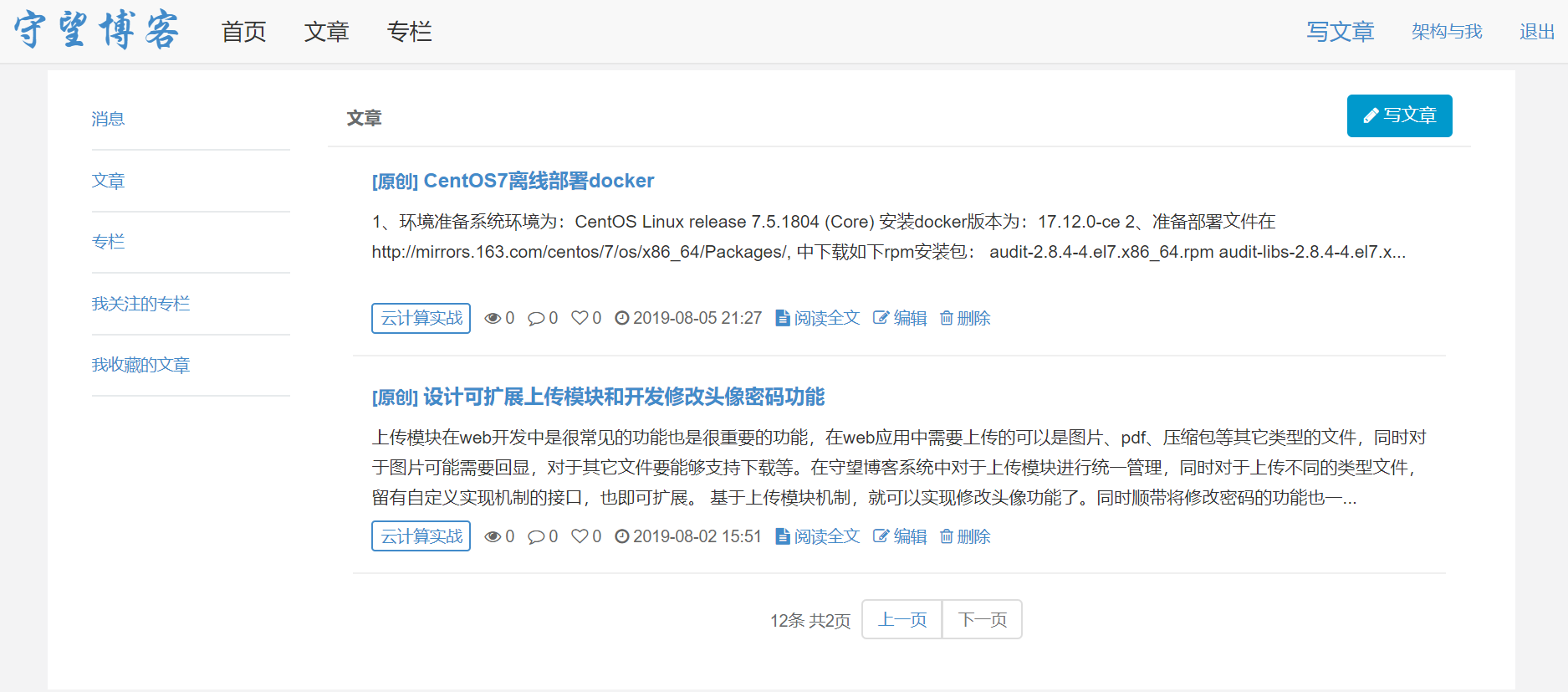显示文章列表一般都是采用分页显示,比如每页10篇文章显示。这样就不用每次就将所有的文章查询出来,而且当文章数量特别多的时候,如果一次性查询出来很容易出现OOM异常。
后台的分页插件采用的是mybatis-plus自带的,前端显示时利用boostrap的风格显示。
1、开启分页插件
对于mybatis-plus框架,开启分页插件是很简单的,只需要加一个配置类,即:
/**
* Mybatis Plus分页配置类
*
* @author lzj
* @since 1.0
* @date [2019-08-11]
*/
@EnableTransactionManagement
@Configuration
@MapperScan("com.swnote.*.dao.*")
public class MybatisPlusConfig {
/**
* 分页插件
*/
@Bean
public PaginationInterceptor paginationInterceptor() {
PaginationInterceptor paginationInterceptor = new PaginationInterceptor();
return paginationInterceptor;
}
}
这样就将分页插件配置好了。
2、文章分页后台逻辑
mybatis-plus框架很友好的提供好分页查询的功能,为此在后台可以直接调用,核心的逻辑为:
/**
* 分页加载出文章列表页面
*
* @param code
* @param pageIndex
* @param model
* @param session
* @return
*/
@RequestMapping(value = "/u/{code}/article/{pageIndex}", method = RequestMethod.GET)
public String list(@PathVariable("code") String code, @PathVariable("pageIndex") int pageIndex, Model model, HttpSession session) throws Exception {
// 根据code获取用户信息
User user = userService.getByCode(code);
if (user == null) {
log.error("code:" + code + ",不存在的用户");
throw new Exception("不存在的用户");
}
String userId = user.getUserId();
// 获取登录信息
User tempUser = (User) session.getAttribute(Const.SESSION_USER);
// 判断是否是该用户的笔记集
boolean flag = false;
if (tempUser != null && userId.equals(tempUser.getUserId())) {
flag = true;
}
// 构建查询条件
Map<String, Object> params = new HashMap<String, Object>();
params.put("userId", userId);
if (!flag) {
params.put("status", Article.STATUS_SUCCESS);
}
// 分页查询
IPage<Article> articles = articleService.page(new Page<Article>(pageIndex, 10), new QueryWrapper<Article>().allEq(params).orderByDesc("publishTime"));
// 获取文章相关的信息
List<Article> list = articles.getRecords();
if (list != null && !list.isEmpty()) {
list.stream().forEach(article -> {
// 作者用户ID,获取用户信息
User articleUser = userService.getById(article.getUserId());
if (StringUtils.isEmpty(articleUser.getRealName())) {
article.setUserName(articleUser.getLoginName());
} else {
article.setUserName(articleUser.getRealName());
}
// 根据专栏ID,获取专栏信息
if (!StringUtils.isEmpty(article.getGroupId())) {
Group articleGroup = groupService.getById(article.getGroupId());
article.setGroupName(articleGroup.getName());
}
});
}
model.addAttribute("user", user);
model.addAttribute("articles", articles);
return Const.BASE_INDEX_PAGE + "blog/article/list";
}
里面最主要的分页查询代码为:
// 分页查询
IPage<Article> articles = articleService.page(new Page<Article>(pageIndex, 10), new QueryWrapper<Article>().allEq(params).orderByDesc("publishTime"));
3、文章分页前台逻辑
其实分页前台逻辑主要是将分页的页码生成好,在此罗列出生成分页页码的核心代码如下:
<#assign articlePages = (articles.total / articles.size)?ceiling>
<#if articlePages gt 1>
<div class="col-md-12" align="center">
<span class="pages-total">${articles.total}条 共${articlePages}页</span>
<ul class="pagination">
<#if articles.current == 1>
<li class="disabled"><a href="javascript:void(0);">上一页</a></li>
<#else>
<#assign pre = articles.current - 1>
<li><a href="${rc.contextPath}/u/${user.code}/article/${pre}">上一页</a></li>
</#if>
<#if articles.current == articlePages>
<li class="disabled"><a href="javascript:void(0);">下一页</a></li>
<#else>
<#assign next = articles.current + 1>
<li><a href="${rc.contextPath}/u/${user.code}/article/${next}">下一页</a></li>
</#if>
</ul>
</div>
</#if>
这个mybatis-plus框架生成分页数据好像生成的总页数没有传过来,所以在前台将总页数计算出来,即:
<#assign articlePages = (articles.total / articles.size)?ceiling>
前台文章列表展示风格如下:

关注我
以你最方便的方式关注我:
微信公众号:
